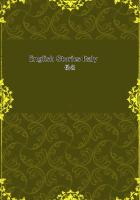There was once a king and queen who had a little boy, and they called his name Kilweh. The queen, his mother, fell ill soon after his birth, and as she could not take care of him herself she sent him to a woman she knew up in the mountains, so that he might learn to go out in all weathers, and bear heat and cold, and grow tall and strong. Kilweh was quite happy with his nurse, and ran races and climbed hills with the children who were his playfellows, and in the winter, when the snow lay on the ground, sometimes a man with a harp would stop and beg for shelter, and in return would sing them songs of strange things that had happened in the years gone by.
But long before this changes had taken place in the court of Kilweh's father. Soon after she had sent her baby away the queen became much worse, and at length, seeing that she was going to die, she called her husband to her and said:
'Never again shall I rise from this bed, and by and bye thou wilt take another wife. But lest she should make thee forget thy son, I charge thee that thou take not a wife until thou see a briar with two blossoms upon my grave.' And this he promised her. Then she further bade him to see to her grave that nothing might grow thereon. This likewise he promised her, and soon she died, and for seven years the king sent a man every morning to see that nothing was growing on the queen's grave, but at the end of seven years he forgot.
One day when the king was out hunting he rode past the place where the queen lay buried, and there he saw a briar growing with two blossoms on it.
'It is time that I took a wife,' said he, and after long looking he found one. But he did not tell her about his son; indeed he hardly remembered that he had one till she heard it at last from an old woman whom she had gone to visit. And the new queen was very pleased, and sent messengers to fetch the boy, and in his father's court he stayed, while the years went by till one day the queen told him that a prophecy had foretold that he was to win for his wife Olwen the daughter of Yspaddaden Penkawr.
When he heard this Kilweh felt proud and happy. Surely he must be a man now, he thought, or there would be no talk of a wife for him, and his mind dwelt all day upon his promised bride, and what she would be like when he beheld her.
'What aileth thee, my son?' asked his father at last, when Kilweh had forgotten something he had been bidden to do, and Kilweh blushed red as he answered:
'My stepmother says that none but Olwen, the daughter of Yspaddaden Penkawr, shall be my wife.'
'That will be easily fulfilled,' replied his father. 'Arthur the king is thy cousin. Go therefore unto him and beg him to cut thy hair, and to grant thee this boon.'
Then the youth pricked forth upon a dapple grey horse of four years old, with a bridle of linked gold, and gold upon his saddle. In his hand he bore two spears of silver with heads of steel; a war-horn of ivory was slung round his shoulder, and by his side hung a golden sword. Before him were two brindled white-breasted greyhounds with collars of rubies round their necks, and the one that was on the left side bounded across to the right side, and the one on the right to the left, and like two sea-swallows sported round him. And his horse cast up four sods with his four hoofs, like four swallows in the air about his head, now above, now below. About him was a robe of purple, and an apple of gold was at each corner, and every one of the apples was of the value of a hundred cows. And the blades of grass bent not beneath him, so light were his horse's feet as he journeyed toward the gate of Arthur's palace.
'Is there a porter?' cried Kilweh, looking round for someone to open the gate.
'There is; and I am Arthur's porter every first day of January,' answered a man coming out to him. 'The rest of the year there are other porters, and among them Pennpingyon, who goes upon his head to save his feet.'
'Well, open the portal, I say.'
'No, that I may not do, for none can enter save the son of a king or a pedlar who has goods to sell. But elsewhere there will be food for thy dogs and hay for thy horse, and for thee collops cooked and peppered, and sweet wine shall be served in the guest chamber.'
'That will not do for me,' answered Kilweh. 'If thou wilt not open the gate I will send up three shouts that shall be heard from Cornwall unto the north, and yet again to Ireland.'
'Whatsoever clamour thou mayest make,' spake Glewlwyd the porter, 'thou shalt not enter until I first go and speak with Arthur.'
Then Glewlwyd went into the hall, and Arthur said to him:
'Hast thou news from the gate?' and the porter answered:
'Far have I travelled, both in this island and elsewhere, and many kingly men have I seen; but never yet have I beheld one equal in majesty to him who now stands at the door.'
'If walking thou didst enter here, return thou running,' replied Arthur, 'and let everyone that opens and shuts the eye show him respect and serve him, for it is not meet to keep such a man in the wind and rain.' So Glewlwyd unbarred the gate and Kilweh rode in upon his charger.
'Greeting unto thee, O ruler of this land,' cried he, 'and greeting no less to the lowest than to the highest.'
'Greeting to thee also,' answered Arthur. 'Sit thou between two of my warriors, and thou shalt have minstrels before thee and all that belongs to one born to be a king, while thou remainest in my palace.'
'I am not come,' replied Kilweh, 'for meat and drink, but to obtain a boon, and if thou grant it me I will pay it back, and will carry thy praise to the four winds of heaven. But if thou wilt not grant it to me, then I will proclaim thy discourtesy wherever thy name is known.'
'What thou askest that shalt thou receive,' said Arthur, 'as far as the wind dries and the rain moistens, and the sun revolves and the sea encircles and the earth extends. Save only my ship and my mantle, my word and my lance, my shield and my dagger, and Guinevere my wife.'
'I would that thou bless my hair,' spake Kilweh, and Arthur answered:
'That shall be granted thee.'















